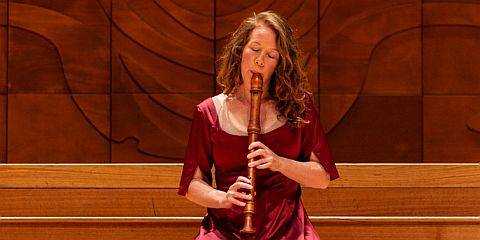MCO’s The Beginning of the World can be heard on Thursday 22 June 7:30pm and Sunday 25 June 2:30pm at Melbourne Recital Centre and at Peninsula Community Theatre in Mornington on Saturday 24 June 7:30pm.
With performances just a week away, MCO Artistic Director Sophie Rowell spoke to Genevieve Lacey about inspirations, collaborations and the beautiful music in The Beginning of the World.
Sophie Rowell: It has been such a pleasure to craft this beautiful program of English music with you based on the inspiration provided by a very old, and very well-loved folk tune. What is it that inspires and excites you about this concert?
Genevieve Lacey: I’m excited about the genuine chamber music quality of this concert and the beautiful, unusual repertoire. Normally when I play with orchestras, it’s a much more standard relationship of soloist and orchestra, but MCO are really special, in that the conversational, collaborative nature of the ensemble is always at the fore. So we’ve conceived a program that is intimate, all about listening, and not so much in that ’stand and deliver’ nature of concertos, but rather an exploration of a particularly lyrical vein of English, pastoral repertoire, across many centuries. This is the kind of program you can only play with musicians you know, love and trust — it comes out of a long relationship with MCO, and I’ve been looking forward to it for months.
Sophie Rowell: The composer & arranger Erkki Veltheim and you have been long time collaborators, and we are very fortunate that he has helped us to bring this program to life. Erkki has a magical way of working with people to help bring their music and musicianship to the fore. Can you give us a little insight into your process with Erkki?
Genevieve Lacey: You’re right that Erkki and I have worked together in many ways over the years, firstly as colleagues who played together, and more recently, as colleagues who create large-scale, multi-artform works together. Erkki is an astonishing musician with a remarkable intellect and imagination. He’s voraciously curious about music, across many times, genres and cultures. In this instance, I simply handed him a bunch of tunes, we talked through the context, the players, and the rest of the repertoire on the program. We tossed some ideas back and forth, I recorded all the melodies for him so he could hear how I heard and played them, and then he came back with these stunning arrangements. I haven’t changed a note — they’re amazing, and I can’t wait to play them.
Sophie Rowell: I love the Gordon Jacob Suite but only came to know if through your wonderful suggestion. It sheds such a different light on your instrument. Tell us a little about Jacob and this piece – how did he come to write so masterfully for the recorder?
Genevieve Lacey: I’m rapt to be playing this piece. I’ve never performed it before, but it’s been on my wish list a very long time. It’s previously felt impossible to find the right context for it, but this one was literally made for it. It’s absolutely true that this suite draws elegiac, lyrical yearnings out of the recorder that many people might not have heard before, as well as an impish sense of humour. I love that it’s a suite rather than a concerto — again, chamber music, rather than a pure display of virtuosity. The piece was written for the legendary Carl Dolmetsch, an instrument maker and extremely fine player, who was a visionary in many ways. His remarkable life in music included commissioning new works for the recorder, to be played at his annual Wigmore Hall concert. The list he commissioned is extraordinary, and includes this piece. I don’t know this for a fact, but I imagine that Jacob and Dolmetsch may well have collaborated on it. But even if they didn’t, thanks to Dolmetsch and the early music movement that was blossoming in England through this period, the sounds of early instruments, and early repertoire was very much in composers’ ears. And in many ways, a collective desire for a simpler, more innocent English life and aesthetic was running deep. Jacob was a prisoner of war in the First World War, during which time he began composing music. He later became a student of Vaughan Williams, among others, and then went on to a significant teaching career, where one of his students was Imogen Holst, who also features in this program. He also had a distinguished career as an arranger, and one of his most popular arrangements was of William Byrd, so just like Erkki’s Playford Maze, many ideas, composers, sounds across this program refer to one another in a lovely tangle of shared ideas and sounds.

